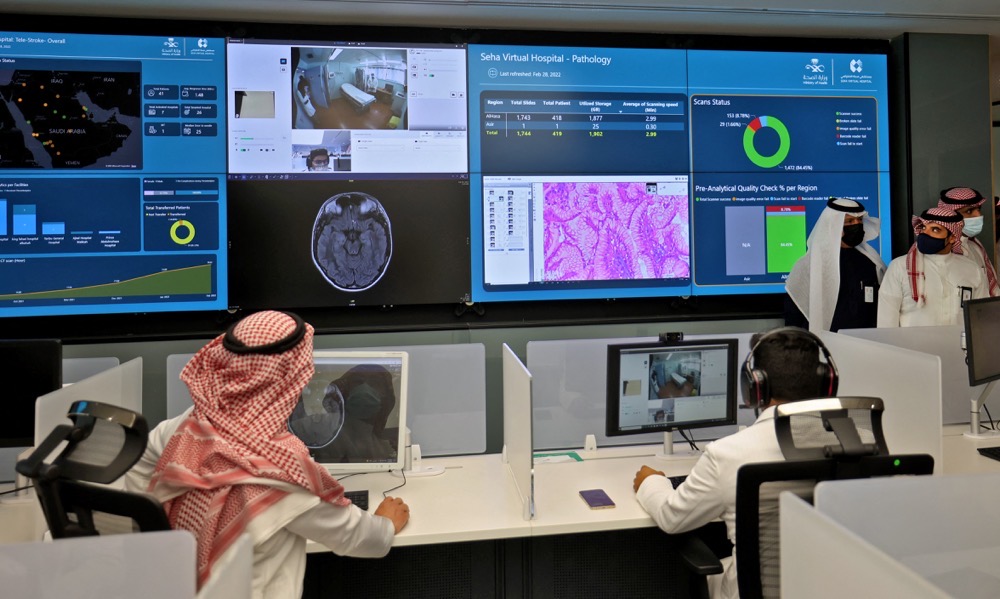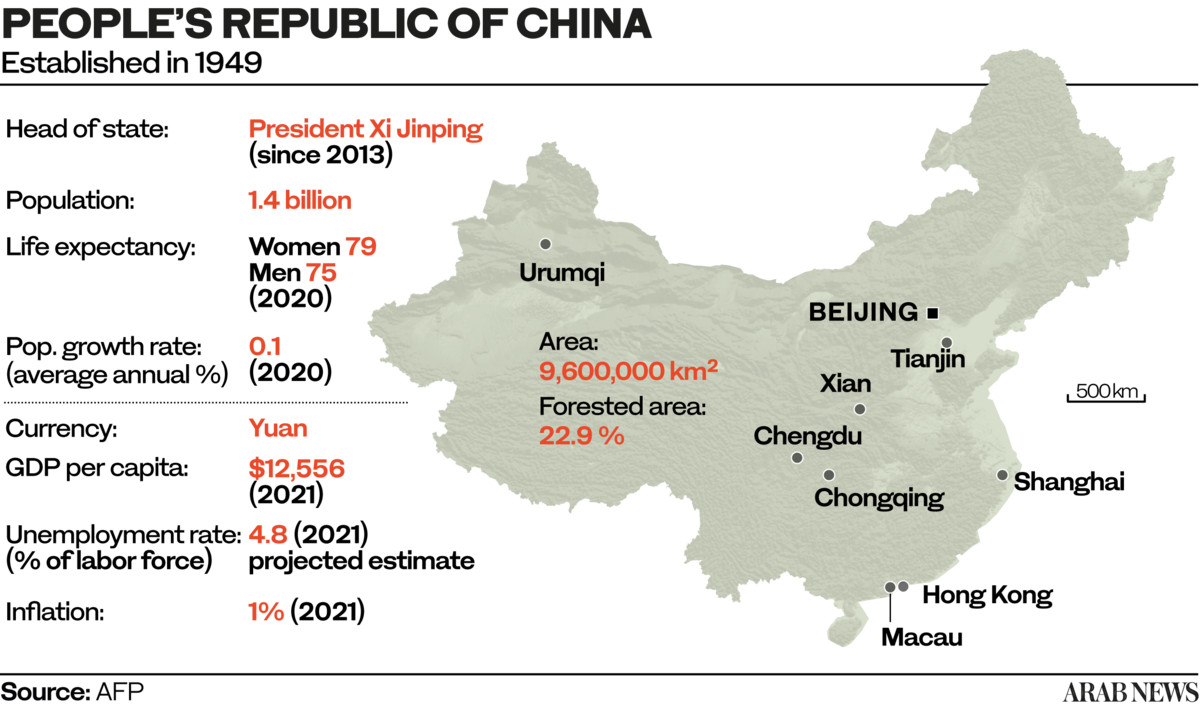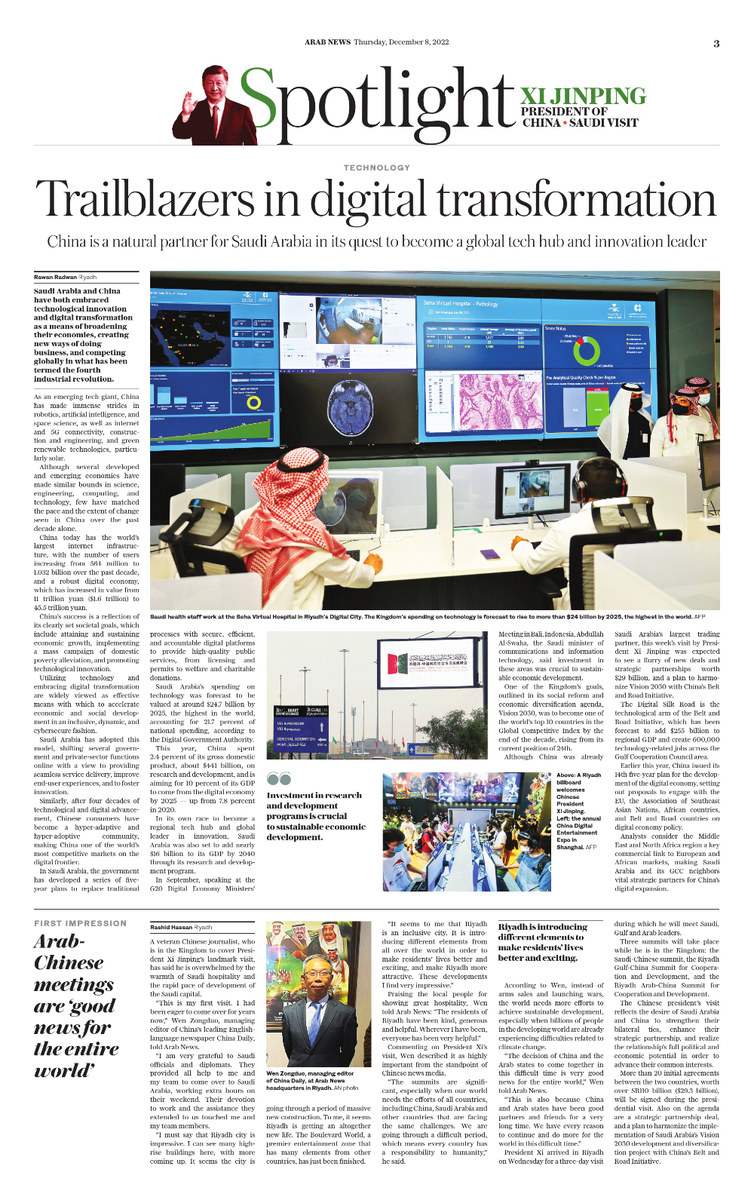RIYADH: Saudi Arabia and China have both embraced technological innovation and digital transformation as a means of broadening their economies, creating new ways of doing business, and competing globally in what has been termed the fourth industrial revolution.
As an emerging tech giant, China has made immense strides in robotics, artificial intelligence, and space science, as well as internet and 5G connectivity, construction and engineering, and green renewable technologies, particularly solar.
Although several developed and emerging economies have made similar bounds in science, engineering, computing, and technology, few have matched the pace and the extent of change seen in China over the past decade alone.
China today has the world’s largest internet infrastructure, with the number of users increasing from 564 million to 1.032 billion over the past decade, and a robust digital economy, which has increased in value from 11 trillion yuan ($1.6 trillion) to 45.5 trillion yuan.

China today has the world’s largest internet infrastructure, with the number of users increasing from 564 million to 1.032 billion over the past decade. (AFP)
China’s success is a reflection of its clearly set societal goals, which include attaining and sustaining economic growth, implementing a mass campaign of domestic poverty alleviation, and promoting technological innovation.
Utilizing technology and embracing digital transformation are widely viewed as effective means with which to accelerate economic and social development in an inclusive, dynamic, and cybersecure fashion.
Saudi Arabia has adopted this model, shifting several government and private-sector functions online with a view to providing seamless service delivery, improve end-user experiences, and to foster innovation.
Similarly, after four decades of technological and digital advancement, Chinese consumers have become a hyper-adaptive and hyper-adoptive community, making China one of the world’s most competitive markets on the digital frontier.

In Saudi Arabia, the government has developed a series of five-year plans to replace traditional processes with secure, efficient, and accountable digital platforms to provide high-quality public services, from licensing and permits to welfare and charitable donations.
Saudi Arabia’s projected spending on technology is valued at around $24.7 billion by 2025, the highest in the world, accounting for 21.7 percent of national spending, according to the Digital Government Authority.
This year, China spent 2.44 percent of its gross domestic product, approximately $441 billion, on research and development, and is aiming for 10 percent of its GDP to come from the digital economy by 2025 — up from 7.8 percent in 2020.

Saudi Arabia’s projected spending on technology is valued at around $24.7 billion by 2025. (AFP)
In its own race to become a regional tech hub and global leader in innovation, Saudi Arabia was also set to add nearly $16 billion to its GDP by 2040 through its research and development program.
In September, speaking at the G20 Digital Economy Ministers’ Meeting in Bali, Indonesia, Abdullah Al-Swaha, the Saudi minister of communications and information technology, said investment in these areas was crucial to sustainable economic development.
One of the Kingdom’s goals, outlined in its social reform and economic diversification agenda, Vision 2030, was to become one of the world’s top 10 countries in the Global Competitive Index by the end of the decade, rising from its current position of 24th.
Although China was already Saudi Arabia’s largest trading partner, this week’s visit by President Xi Jinping was expected to see a flurry of new deals and strategic partnerships worth $29 billion and a plan to harmonize Vision 2030 with China’s Belt and Road Initiative.

The Digital Silk Road is the technological arm of the Belt and Road Initiative, which has been forecast to add $255 billion to regional GDP and create 600,000 technology-related jobs across the Gulf Cooperation Council area.
Earlier this year, China issued its 14th five-year plan for the development of the digital economy, setting out proposals to actively engage with the EU, the Association of Southeast Asian Nations, African countries, and Belt and Road countries on digital economy policy.
Analysts consider the Middle East and North Africa region a critical commercial link to European and African markets, making Saudi Arabia and its GCC neighbors vital strategic partners for China’s digital expansion.

















